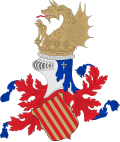This article needs additional citations for verification .(April 2024) |
Benissoda | |
|---|---|
| Coordinates: 38°49′57″N0°31′51″W / 38.83250°N 0.53083°W | |
| Country | |
| Autonomous community | |
| Province | Valencia |
| Comarca | Vall d'Albaida |
| Judicial district | Ontinyent |
| Government | |
| • Alcalde | Salvador Roig Espí |
| Area | |
• Total | 4 km2 (1.5 sq mi) |
| Elevation | 319 m (1,047 ft) |
| Population (2025-01-01) [1] | |
• Total | 494 |
| • Density | 120/km2 (320/sq mi) |
| Demonym(s) | Benissodà, benissodana |
| Time zone | UTC+1 (CET) |
| • Summer (DST) | UTC+2 (CEST) |
| Postal code | 46869 |
| Official language(s) | Valencian |
| Website | Official website |
Benissoda (Spanish : Benisoda) is a municipality in the comarca of Vall d'Albaida in the Valencian Community, Spain.


